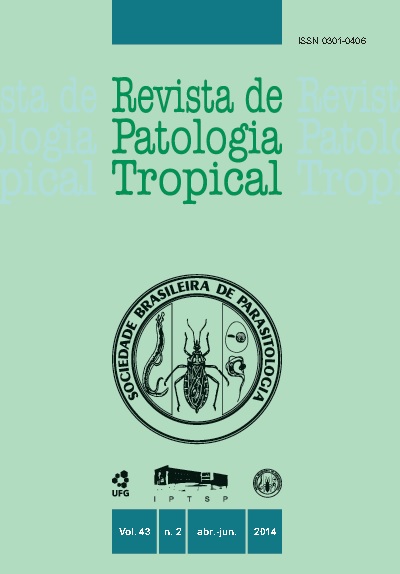ANTIMICROBIAL SUSCEPTIBILITY PROFILE OF Brucella spp. ISOLATED IN BRAZIL
DOI:
https://doi.org/10.5216/rpt.v43i2.31110Keywords:
Brucella, brucellosis, E-test, resistance, rifampicin, SE-AFLPAbstract
The intention of this work was to investigate the susceptibility profile of 27 Brucella strains isolated from animals in Brazil, using the E-test method with antimicrobials recommended for the treatment of human brucellosis, to monitor the activities of these antimicrobials and their potential efficacy for human brucellosis treatment. Efficiency of SE-AFLP in determining the genetic diversity of the species of Brucella and its correlation with their susceptibility profile was also evaluated. All 27 strains were susceptible to doxycycline. With the exception of one strain of B. canis and of B.abortus, all strains were susceptible to gentamicin and streptomycin. Of the wild Brucella strains tested, ten, nine and five showed reduced susceptibility to rifampicin, ceftriaxone and trimetoprim/ sulfamethoxazole, respectively. One B. abortus and three B. canis strains showed multi-resistance profiles. The strain of B. abortus was resistant to streptomycin, rifampicin and ceftriaxone. Two strains of B. canis were resistant to rifampicin, ceftriaxone and trimetoprim/sulfamethoxazole, and one strain was resistant to rifampicin, ceftriaxone, streptomycin and gentamicin. Rifampicin,
in combination with doxycycline, is one of the principal antibiotics prescribed to treat human brucellosis. The occurrence of strains resistant to rifampicin and other antimicrobials must be monitored before initiating this treatment, since the resistance of these strains could be one of the causes of the failure of some brucellosis treatment. No relationship was observed between SE-AFLP profiles and regional origin of the strains; neither between SE-AFLP profiles and antimicrobial profiles.
Downloads
Downloads
Published
How to Cite
Issue
Section
License
The manuscript submission must be accompanied by a letter signed by all authors stating the full name and email address, confirming that the material has not been published or is under consideration for publication elsewhere, and agreeing to transfer copyright in all media and formats for Journal of Tropical Pathology. The authors will not be paid for published articles. They are solely responsible for the content of those articles, even if the Editor holds the right to adjust them to the norms of the journal.
The reviewers will not be paid for the peer review process.

